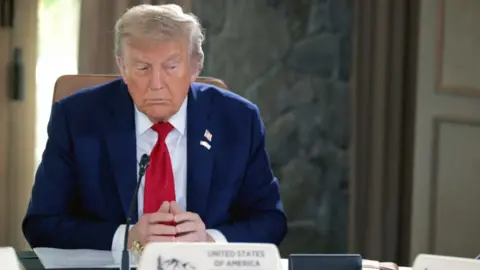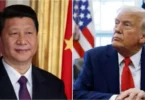State Department correspondent
 Getty Images
Getty ImagesPresident Trump’s comments on the Israel-Iran conflict have veered from full throated support for Israel’s strikes to strongly distancing himself from them, and back again.
His ambiguity has added to the sense of uncertainty as the fighting itself escalates.
Meanwhile the Israeli prime minister Benjamin Netanyahu has said the attacks were “fully coordinated” with the US.
So what factors are weighing on Trump and, crucially, what are his options now?
1. Bowing to Netanyahu pressure and escalating
As Israeli missiles hit Tehran on Thursday, Trump threatened Iran’s leaders with “even more brutal” attacks from his Israeli ally armed with American bombs.
We know Trump’s ultimate objective. He says, like Netanyahu, that Iran can’t have a nuclear bomb. Crucially, he has said his preferred option (unlike Netanyahu) is via a deal between the US and Iran (this route also reflects his self-described image as a world-class dealmaker).
But he has equivocated over how to get there, sometimes leaning into the threat of force, other times pushing the diplomacy. Last week he even said in the same breath that an Israeli attack on Iran would help a deal or it would “blow it”.
His unpredictability is sometimes portrayed by his supporters after the fact as strategic – the so-called “madman” theory of foreign relations. This theory is one that has previously been used to describe Trump’s negotiating tactics and suggests that deliberate uncertainty or unpredictability about escalation works to coerce adversaries (or even allies in Trump’s case) into complying. It was famously attributed to some of the Cold War practices of President Richard Nixon.
Some of Trump’s advisers and supporters back the “maximum pressure” side of the madman theory when it comes to his approach to Iran. They think the threats will in the end prevail because, they argue, Iran is not serious about negotiating (even though in 2015 the country signed an Obama-led nuclear deal that Trump later pulled out of).
 Getty Images
Getty ImagesNetanyahu has applied constant pressure on Trump to go down the military not diplomatic path, and the US president – despite his oft-stated desire to win the Nobel Peace Prize – may in the end see a need to deliver on his more belligerent threats to Tehran’s leadership
Israel may also push harder behind the scenes for American involvement to, as it sees it, to finish the job. The US has bunker buster bombs Israel believes can destroy Iran’s underground uranium enrichment site at Fordow.
As the fighting escalates, so does the pressure on Trump from the hawkish camp of Republicans in Congress who have long called for regime change in Iran.
Trump will also see the argument that it could force the Iranians into negotiating with him with a now weaker hand. But the fact remains that the Iranians already were at that table, as a sixth round of talks due with Trump’s envoy Steve Witkoff had been planned in Oman on Sunday.
The talks are now abandoned.
2. The middle ground – holding the course
So far, Trump has reiterated that the US is not involved in Israel’s attacks.
Escalation comes with significant and potentially legacy-defining risks for Trump. American naval destroyers and ground based missile batteries are already helping in Israel’s defence against the Iranian retaliation.
Some of Trump’s advisers at the National Security Council are likely to be cautioning against him doing anything that could add to the intensity of Israel’s attacks on Iran in the immediate days, especially with some Iranian missiles breaching Israeli-US defences to deadly effect.
Netanyahu is now arguing that targeting Iran’s Supreme Leader Ali Khamenei would end, not escalate, the conflict.
But an anonymous US official briefed to some news outlets at the weekend that Trump made clear he was against such a move.
 Getty Images
Getty Images3. Listening to the Maga voices and pulling back
One of the big political factors playing on Trump’s mind is his domestic support.
Most Republicans in Congress still staunchly back Israel, including continued American arms supplies to the country. Many have vocally backed Israel’s attacks on Iran.
But there are key voices within Trump’s Make America Great Again (Maga) movement who now outright reject this traditional “ironclad” support for Israel.
Over the last few days they’ve asked why the US is risking being drawn into a Middle East war given Trump’s “America First” foreign policy promise.
The pro-Trump journalist Tucker Carlson wrote a stinging criticism on Friday saying the administration’s claims not to be involved weren’t true, and that the US should “drop Israel”.
He suggested Mr Netanyahu “and his war-hungry government” were acting in a way that would drag in US troops to fight on his behalf.
Carlson wrote: “Engaging in it would be a middle finger in the faces of the millions of voters who cast their ballots in hopes of creating a government that would finally put the United States first.”
Similarly, the staunch Trump loyalist US representative Marjorie Taylor Greene posted on X that: “Anyone slobbering for the US to become fully involved in the Israel/Iran war is not America First/MAGA”.
This represents a considerable vulnerability for Trump.
It adds pressure on him to put distance between the US and Israel’s offensive and there are signs, in public at least, that he has responded.
The Maga debate over the weekend coincided with him posting on social media that he joined Russia’s president Putin in calling for an end to the war. By Sunday he said Iran and Israel should make a deal, adding: “The US had nothing to do with the attack on Iran”.
Iran has already threatened to attack US bases in the region if, as is now happening, Washington assists Israel’s defence.
The risk of any American casualties would likely see the Maga isolationist argument grow exponentially, in turn potentially adding pressure on Trump to pull back and urge Mr Netanyahu to bring the offensive to a swifter end.









